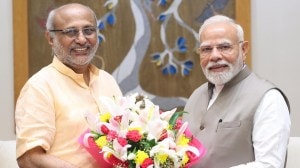Russia, Israel quibble, IAF awaits AWACS
Soon after National Security Advisor Brajesh Mishra returns from Washington next month, he is expected to fly to Tel Aviv to expedite the PH...

Soon after National Security Advisor Brajesh Mishra returns from Washington next month, he is expected to fly to Tel Aviv to expedite the PHALCON Airborne Early Warning and Control System (AWACS) deal for the armed forces.
The PHALCON deal is stuck due to the Russian insistence of signing an agreement with Israel to ensure that blueprints of the AWACS platform — in this case a IL-76TD plane — are not passed on to another country apart from the user, India.
While the dates of Mishra’s visit are being finalised, it is learnt that he will hold discussions with his Israeli counterpart, Efraim Halevi, and Foreign Minister Benjamin Netanyahu on this issue besides impact of the Iraq War on the security of the Gulf region. While Moscow is keen on signing a tripartite agreement with New Delhi and Tel Aviv, South Block sources say that they are keen on protecting the original blueprints of the Il-76 TD. However Israel, master at reverse engineering and adapting foreign arms designs, has turned down the Russian demand on the grounds that they have never entered into similar deals with any design partner.
For years India’s military has been looking for an AWACS, considered a major force multiplier and serves as a military’s ‘‘eyes in the sky’’ during battle. The lack of an AWACS was acutely felt during the Kargil War, when the IAF improvised by sending up helicopters to mark targets. An AWACS would enable the IAF to direct its interceptors to a threat from across the border the moment it is airborne.
In fact, the Parliamentary Standing Committee on Defence has highlighted the need for an AWACS in its latest report which was tabled in Parliament last week. In its reply to the committee’s inquiries, the MoD has stated that a ‘‘technical configuration has been finalised in May/June 2000 with Israel.’’ It was decided that an AWACS would be based on the new Il-76 TD designed by Tashkent Aircraft Production Company and be re-engineered with a more powerful PS-90A engine.
India has already sought a commercial proposal with the Israeli electronics major ELTA, a subsidiary of the Israeli Aircraft Industries Pvt Ltd which has collaborated on several projects including the Su-30 MKI projects. The cost proposed by ELTA is in the region of a US $ 120 million. New Delhi is also keen to partner the Israelis in developing the Arrow-II missile system which is married to the Greenpine radar which has been acquired by India earlier.
Photos



- 01
- 02
- 03
- 04
- 05



























